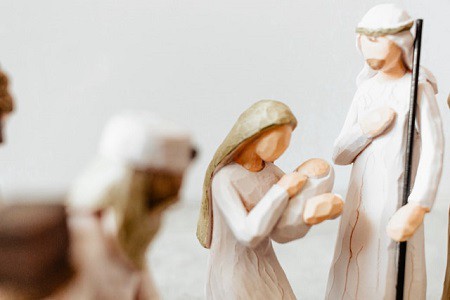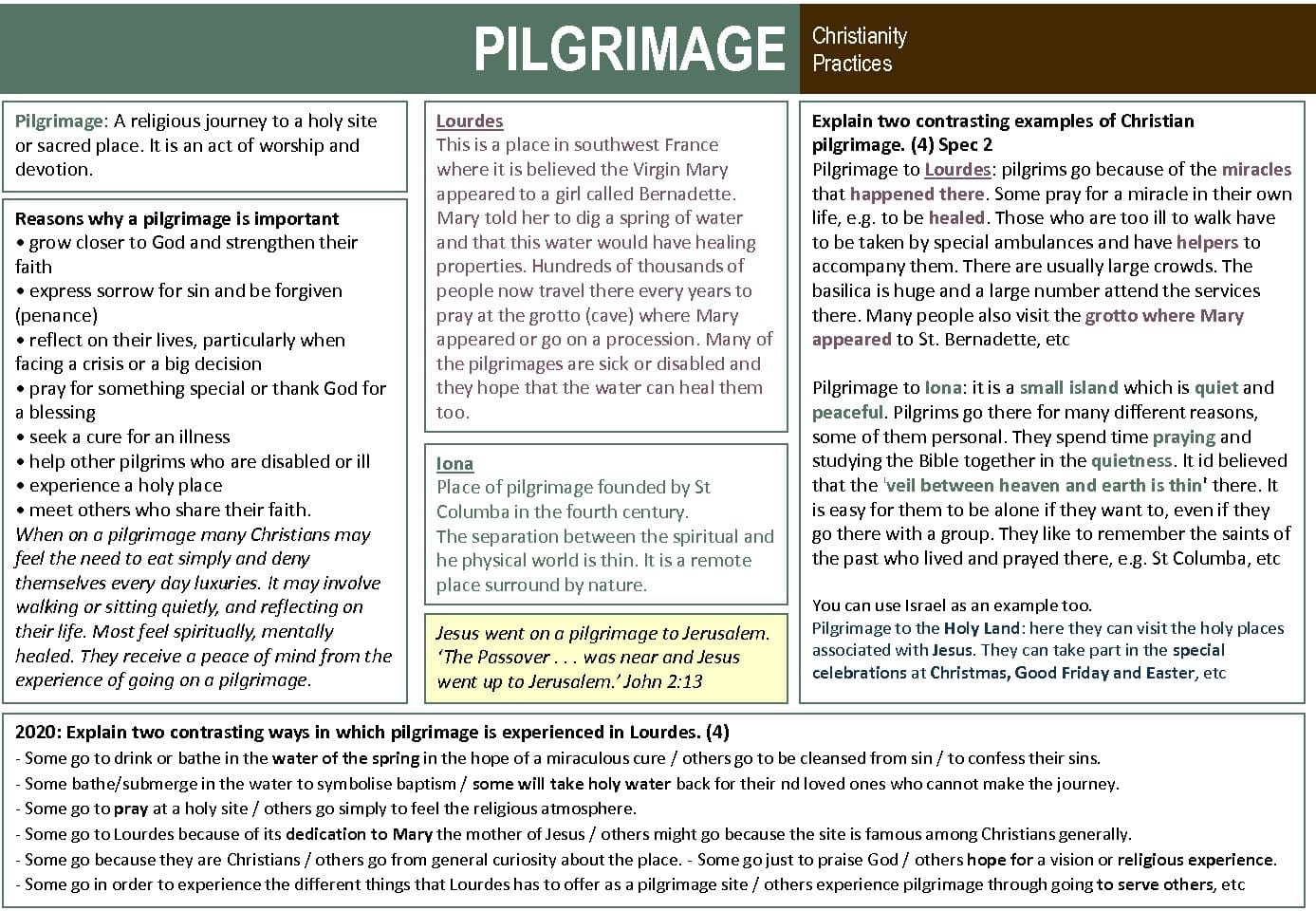Christian practices
The role and importance of pilgrimage and celebrations including:
- Two contrasting examples of Christian pilgrimage: Lourdes and Iona
- The celebrations of Christmas and Easter, including their importance for Christians in Great Britain today.
Pilgrimage
Explain two contrasting examples of Christian pilgrimage. (4)
Spec 2
- pilgrimage to Lourdes: pilgrims go because of the miracles that happened there/some pray for a miracle in their own life, eg to be healed/those who are too ill to walk have to be taken by special ambulances and have helpers to accompany them/there are usually large crowds/the basilica is huge and a large number attend the services there/many people also visit the grotto where Mary appeared to St. Bernadette, etc
- pilgrimage to Iona: it is a small island which is quiet and peaceful/ pilgrims go there for many different reasons, some of them personal/they spend time praying and studying the Bible together in the quietness/it is easy for them to be alone if they want to, even if they go there with a group/it does not get crowded except in some of the old buildings which people like to visit/they like to remember the saints of the past who lived and prayed there, eg St Columba, etc
- pilgrimage to Lindisfarne: they can walk across from the mainland when the tide is out/or go by car or bus across the causeway/they van visit the ruins of the monastery built on the site associated with St Cuthbert/they can stay in a special retreat centre, ‘What you have heard from me before many witnesses, entrust to faithful men who will be able to teach others also’ etc
- pilgrimage to the Holy Land: here they can visit the holy places associated with Jesus/they can take part in the special celebrations at Christmas, Good Friday and Easter, etc
- pilgrimage to Santiago de Compostela: it involves many days of walking/the climax is visiting what is believed to be the burial place of St James, etc.
Explain two contrasting ways in which pilgrimage is experienced at Lourdes. (4)
2020
• Some go to drink or bathe in the water of the spring in the hope of a miraculous cure / others go to be cleansed from sin / to confess their sins.
• Some bathe/submerge in the water to symbolise baptism / some will take holy water back for their families and loved ones who cannot make the journey.
• Some go to pray at a holy site / others go simply to feel the religious atmosphere.
• Some go to pray the rosary (Bernadette said that she had prayed the rosary) / others hope for a vision of ‘the Immaculate Conception’.
• Some go to Lourdes because of its dedication to Mary the mother of Jesus / others might go because the site is famous among Christians generally.
• Some go because they are Christians / others go from general curiosity about the place.
• Some go just to praise God / others hope for a vision or religious experience.
• Some go in order to experience the different things that Lourdes has to offer as a pilgrimage site / others experience pilgrimage through going to serve others, etc.
Note that the experience of pilgrimage varies greatly, so the contrasts given in the mark scheme are only for illustration, and may be paired with any other suitable contrast such as: those who go to walk the Stations of the Cross / those who light candles for those at home / those who go to get closer to God / to learn about God / to find forgiveness and reconciliation with God / to meditate on Jesus’ life and death / to visit the basilica of the Immaculate Conception in the chapel over the grotto / those who wish to satisfy general interest / to learn more about the history of the site generally / those who go for the sake of the attractions of Lourdes as a tourist site near the Pyrenees, to have an unusual holiday (Lourdes has more hotels per square km than anywhere in France save Paris), etc.
Festivals
Explain two religious reasons why Christians celebrate Easter. (5)
2022
• Christians celebrate festivals because they help Christians to remember / the important events underlying their faith / and to keep them fresh in their minds / collective declaration of faith.
• Easter is the most important Christian festival because it celebrates the resurrection of Jesus from the dead / Jesus had conquered death.
• Paul mocked the power of death, saying that it no longer has the power to terrify Christians / because whereas that which is buried in the grave is perishable / what is resurrected will be immortal.
• Christian teaching is that death entered the world through the sin of Adam / Jesus’ sacrifice on the cross atones for that sin / so humanity can overcome death through that atonement.
• Some will refer to the narrative of Jesus’ crucifixion, and its emphasis that Jesus had really died and had therefore really risen from the dead.
• Some will refer further to the narrative of Jesus’ entombment / the guard set on the tomb / and the resurrection on the third day / as evidence for the factual nature of the narrative and the reality of the resurrection / and the basis for celebration of that narrative.
• The resurrection of Jesus is seen by Christians as the fulfilment of scripture / and the whole focus of the New Testament narrative / Jesus as the Son was sent by God / to teach, preach and heal / and to show how believers should behave / in order to inherit eternal life / hence Easter celebrates the entirety of the Christian message.
• Some might refer to the resurrection narratives (eg Luke 24) and the Ascension as the ‘proof’ of Jesus having risen from the dead / and the fact that all of these sayings and ideas are at the heart of the celebration of Easter.
• Reference might be made to the ‘why?’ of the different celebrations of the Church within Easter, eg the eating of eggs to symbolise new life through Christ, etc.
‘Christmas is the most important Christian celebration.’ (12)
2020
Arguments in support
• Christmas celebrates the birth of Jesus, the Saviour and Founder of the Faith / without Jesus’ birth there would be no Christian faith, so Christmas is the most important Christian celebration.
• ‘Christmas’ is ‘Christ Mass’, Mass being the Eucharist/Holy Communion where Christians remember that Christ died for the sins of humanity and was resurrected by God / so Christmas includes the main theme of Easter – resurrection – so it is the most important celebration.
• Christmas celebrates the birth of the Messiah, believed by Christians to be the ‘Prince of Peace’ prophesied by Isaiah, so it celebrates the fulfilment of prophecy / it also celebrates the birth of Jesus in Bethlehem, believed by Christians to be prophesied in Micah 5:2.
• Christmas also celebrates the incarnation of God / this has deep meaning for Christians because Jesus was born as a human, by which God understands what it is like to have human needs and human frailties / what it is like to suffer and die.
• Without Christmas there would be no Easter / Jesus had to be born as a human otherwise he could not have been resurrected from death.
• Christmas brings with it many good things / such as the uniting of families and the giving of gifts / help for the poor and homeless / the Christian spirit of charity and kindness, etc.
• The Midnight Mass and the Christmas Day services are especially joyful celebrations / and are attended by many who would not otherwise go to church, etc.
Arguments in support of other views
• Easter is a more important celebration than any other Christian festival because it focuses on the whole point of the Christian message / the love of God and resurrection after death.
• Holy Week celebrates the anticipation of Easter / it begins with Palm Sunday, which celebrates Jesus’ triumphal entry into Jerusalem / it continues with Maundy Thursday, where the mood changes to reflect the Last Supper and Jesus’ arrest / Good Friday marks the crucifixion and death of Jesus and the seeming hopelessness of his death / Easter Sunday then celebrates the major triumph of the Christian message with the resurrection and all this entails / ie sacrifice to bring about reconciliation between God and humanity / there is a great emphasis on the real human suffering undergone by Jesus and his obedience to God’s will / all these celebrations depend on each other / together they show Christians the importance of Easter.
• Easter marks what Christians believe is anticipated in the Book of Jeremiah – the new covenant between God and humanity / so it is the result of something anticipated for many centuries.
• Easter is celebrated by the gift of chocolate eggs, for example / symbolising the gift of new life through Jesus.
• Like Christmas, Easter is also celebrated as a secular festival, since the giving of eggs and other gifts is common among non-Christians.
• Some will argue that neither celebration is more important than the other / Christmas anticipates and is perfected by Easter / Easter is the fulfilment of the promise of Christmas, etc.
Resources
Videos





